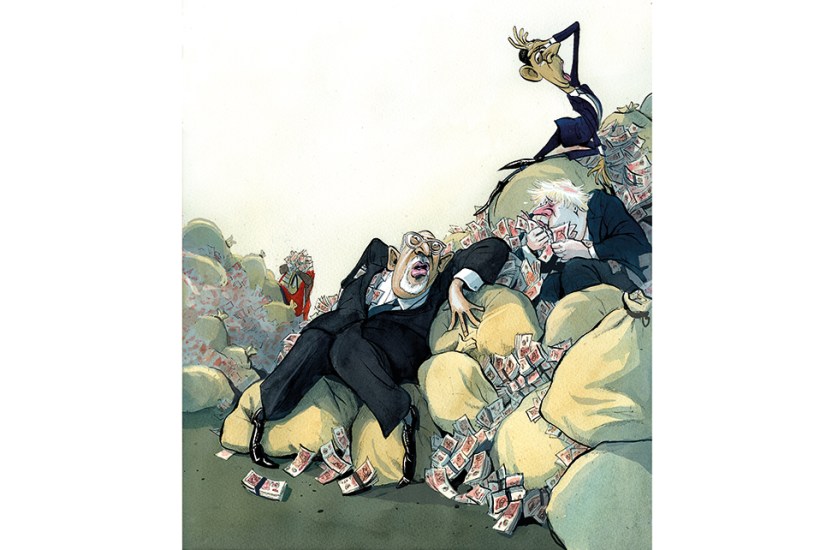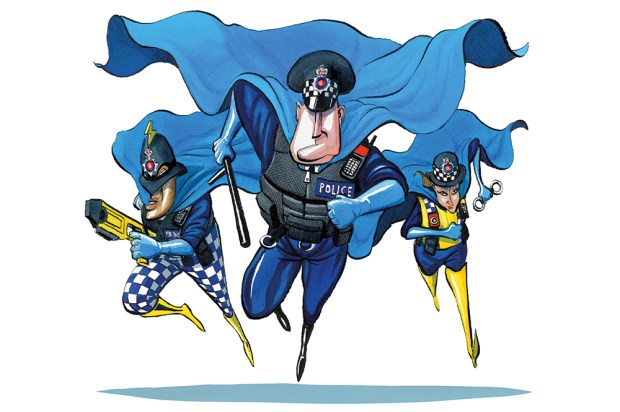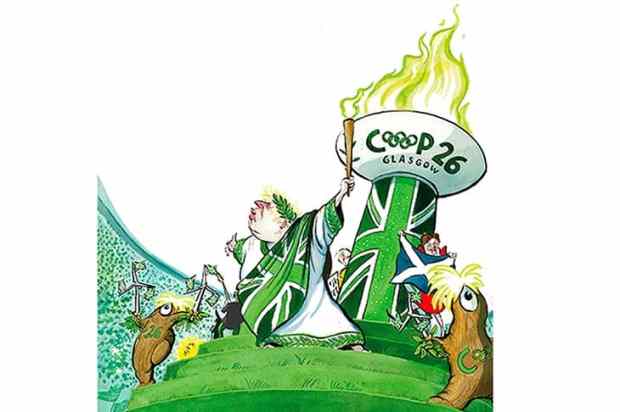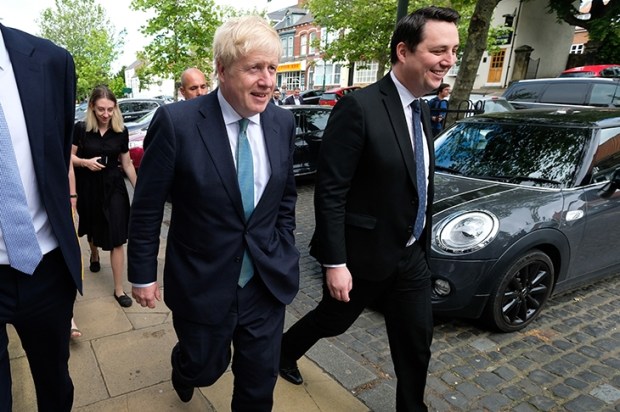When Rishi Sunak stood on the steps of Downing Street to give his first speech as Prime Minister, he had a simple message: ‘This government will have integrity, professionalism and accountability at every level.’ He wanted his premiership to move on from the scandal, mayhem and psycho-drama of his two predecessors. As Michael Gove later put it: ‘Boring is back.’ The government, he said, has an ‘utter determination to try to be as dull as possible’.
But the Tory scandal stories that Sunak is so keen to avoid are not, it seems, over yet. His party chairman, Nadhim Zahawi, is reported to have had to pay a penalty of more than £1 million as part of a settlement to the taxman over a ‘careless’ error. Richard Sharp, the BBC chairman, is under investigation over his alleged role in helping to arrange discussions about an £800,000 loan for the then prime minister Boris Johnson from Johnson’s distant cousin; just a few weeks later, the government announced Sharp as its preferred candidate for chairman. After the loan was agreed the three men had enjoyed a dinner together in Chequers. Meanwhile Dominic Raab, the deputy prime minister, is still under investigation over bullying claims.
‘They used to say the Tories will get done on sex and Labour on money,’ says one former minister. ‘These days, we do both.’ Voters will be especially unforgiving of scandals involving money during a cost-of-living crisis and after the government has raised taxes. The stories bring a sense of déjà-vu to Tory MPs and voters who thought the Boris-era shenanigans had been exhausted.
The most immediate issue facing Sunak regards the future of Zahawi. Sunak earlierthis month assured voters that his party chairman’s tax affairs had been addressed ‘in full’; we’re now told that this assurance was based on the information he had at the time. As was the pattern in the Johnson days, new information has come to light to suggest there may be more questions to answer, so Sunak has called for an investigation. At very least, the Zahawi affair raises questions over the PM’s judgment.
Zahawi’s tax troubles have been in the news ever since he succeeded Sunak (briefly) as chancellor. In the days that followed, there were reports of a National Crime Agency investigation into his tax affairs, which had led to information being passed to HM Revenue and Customs, who then launched their own inquiry. Yet in spite of this he had been sent to run the Treasury.
When Liz Truss won the first leadership contest, she appointed Zahawi to be chancellor of the Duchy of Lancaster. When Sunak took over in the autumn, he offered him the job of party chairman, even though Zahawi had supported Johnson’s return to No. 10.
What was Sunak thinking? Why didn’t he ask Zahawi what the tax row was about, and judge for himself if it was compromising? Such a conversation, it seems, never took place. Both Truss and Sunak say officials did not warn them about Zahawi’s HMRC settlement and that the propriety and ethics team said there were no outstanding issues.
Only this week did Zahawi admit to paying a penalty over his tax. I understand that this was news to Sunak. The Prime Minister has now ordered an independent investigation, saying: ‘There are questions that need answering.’
While that decision has been read in some quarters as Sunak kicking the issue into the long grass – such investigations can take months – the hope in Downing Street is for a swift outcome. Aides are conscious that the longer the scandal drags on, the worse it looks. ‘It would have been easier politically for Sunak to sack him immediately but there has to be a fair process,’ says one government aide. Labour is already on the attack, seeing this as a chance to portray the Tories as decadent rich boys who always have to face awkward tax questions and write huge cheques in the future (as Sunak’s wife Akshata Murthy agreed to do last year after the row over her non-dom status).
Some cabinet ministers already believe the writing is on the wall for Zahawi. Party chairman is one of the government roles which involves frequently facing the cameras. How can he participate in tricky interviews when questions will inevitably pivot back to his tax status? Such as: why did so much of his fortune end up in a trust controlled by his parents? Might it have been a shelter to keep his money away from the tax man until the day he would emigrate to a tax haven? Unkind suggestions, perhaps. But Zahawi can expect a lot more of them. ‘The problem is that, even if he has found to have been within the rules, it won’t pass the public fairness test,’ says a minister. Similar points were made when Sunak tried to defend his wife’s tax arrangements last year.
Labour will now use every financial disclosure, big or small, as proof of Tory sleaze. The level of wealth sitting around the cabinet table is unprecedented: ten years ago, the collective worth of the cabinet ministers was estimated to be £70 million – today it’s more than ten times as much. The Prime Minister’s wife’s family alone is wealthier than the royal family.
In the middle of a spending squeeze, anything that looks like a decadent old boys’ club is particularly difficult. That is partly why questions over Sharp’s appointment as BBC chairman pose another risk. The BBC itself has long resented having a Tory-imposed chairman, and the scandal over the Johnson loan will give the corporation an excuse to pursue the government mercilessly. Sunak, too, has ties to Sharp, having worked for him at Goldman Sachs. When Sunak was chancellor, Sharp helped the government out with loans to businesses at the beginning of the pandemic.
Inside Downing Street, there is already talk about scapegoats. The future of Simon Case, the young cabinet secretary (with whom Sharp discussed the loan), is often mentioned by civil servants. They point to the fact that Case, who was brought in under Johnson, was present during both the Zahawi row and the loan row (and also during partygate, when he had to recuse himself from the inquiry). Case knew about Johnson’s loan. If he knew about Zahawi’s settlement with HMRC, shouldn’t he have quietly raised it with both Truss and Sunak? Could this all catch up with him? Case’s ability to shapeshift for three prime ministers (a colleague compares him to Varys, the skilled courtier and master manipulator from Game of Thrones) means that his colleagues question whose side he is on.
Sunak’s allies say that the loan scandal is further evidence that talk among Johnson’s loyalists of a ‘Bring Back Boris’ movement is misplaced. ‘There is no way it’s happening,’ says a government adviser. ‘It was chaos before when he was in charge and it would be even more chaos now.’ (As far-fetched as it may seem, fear of an attempted Boris restoration is very much alive in No. 10.)
Even without Johnson’s return, there could be more chaos to come. The next investigation into partygate has already begun as the Commons privileges committee calls for evidence into whether Johnson misled parliament. ‘It will be televised and it could be box office,’ predicts a Tory MP. If figures such as Case are summoned to give evidence, they can hardly refuse. Even Johnson’s critics in the Tory party feel worn down by the prospect of more Boris-bashing. ‘The last thing we need is a repeat of last year,’ says a minister. ‘We need to move forward.’
Then there’s Johnson’s resignation honours list to look forward to, which some Tory MPs worry will be a Who’s Who of donors, hangers-on and members of the Johnson family. The proposed peerages supposedly include four sitting Tory MPs, which could spark four by-elections if they move to the upper chamber immediately. Since the Tories currently trail Labour in the polls by around 20 points, that is a situation CCHQ wants to avoid.
Those who are privy to the full honours list – including knighthoods, OBEs and MBEs – say it has more than 100 names. That is roughly twice as many as were on David Cameron’s or Theresa May’s list. Johnson is quite dogged about rewarding his friends, in spite of (or even because of) the reaction of his enemies. Yet there are Tory MPs – ‘at least three’, reports a party old hand – who fear their promise from the former prime minister to include them has not come to fruition. There are rumours that some MPs might try to work their way on to Truss’s resignation honours instead – but a list from a PM who lasted just 49 days has the potential to stir up even more controversy.
Keir Starmer is getting ready to lampoon all of this, and is positioning Labour as the party that will sweep away Johnson’s cronies by abolishing the House of Lords. What is Sunak’s plan? He could block Johnson’s honours, but that would risk a battle with the former PM and his supporters. He could approve them (as expected) but then promise his own system of reform. This move, however, would risk weakening one of the key tools of any prime minister when it comes to enlisting the support of MPs: patronage.
The worry for Sunak is not just that legacy issues will take the sheen off his time in office, it’s that they are starting to become issues that are directly related to his decisions. He already needs to explain why he didn’t look further into Zahawi’s tax affairs at the start of his tenure, given the stories in the papers. And while the Prime Minister could get by without Zahawi, he may soon face a tougher decision regarding his Deputy Prime Minister. An investigation – by Adam Tolley KC – into formal complaints about alleged bullying by Raab is expected to return in the coming weeks. Raab has long been a key supporter of Sunak.
Add to that the other Tory MPs who are under investigation for their behaviour – six of them currently have had the whip removed. ‘I fear the thing that could cause the most carnage is MP misconduct and the party’s handling of complaints,’ says a senior Tory.
All governments face sleaze and scandal eventually. Sunak is a new leader, but he has taken over an old government. The Tories have had 12 years of fatigue. ‘The gradual accumulation of history just catches up with you,’ admits a former cabinet minister. Rather than moving the Tories on from the endless drama, Sunak might ultimately be brought down by his party’s baggage.
Got something to add? Join the discussion and comment below.
Get 10 issues for just $10
Subscribe to The Spectator Australia today for the next 10 magazine issues, plus full online access, for just $10.
You might disagree with half of it, but you’ll enjoy reading all of it. Try your first month for free, then just $2 a week for the remainder of your first year.















Comments
Don't miss out
Join the conversation with other Spectator Australia readers. Subscribe to leave a comment.
SUBSCRIBEAlready a subscriber? Log in